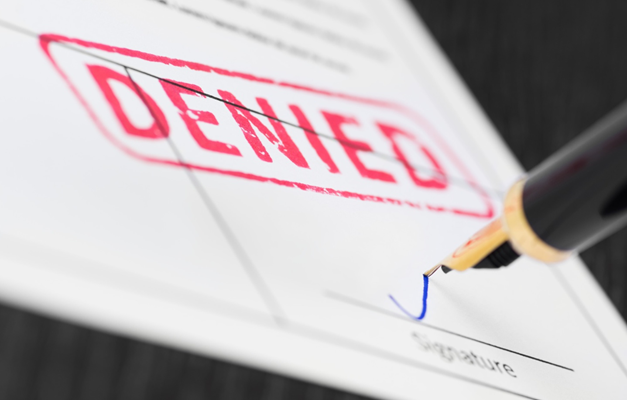You may need some extra cash, and you’ve applied for a loan. But you’ve received a rejection letter from a bank, and it seems like everything was in vain. It might seem like the end of the world, but it doesn’t have to be that way. You have all the right to apply for a loan again and again, but if you don’t change some things, the answer will always be ‘no.’
It’s common for lenders to reject your loan application because of a variety of reasons. Of course, a denial letter might ruin your day, and it’s fine to be disappointed for a while. But you shouldn’t give up. Instead, you should do your best to improve your financial situation and credit rating and become qualified for a loan.
So you might want to use handy tools like forbrukslånkalkulator.net/ and improve your approval chances. In this article, you’ll learn how to improve your credit score, lower your debt-to-income ratio, and make some financial changes. These are some crucial steps to improve your chances of loan approval after being denied.
Reasons for Loan Denial
One of the most common reasons is poor credit. Lenders consider this factor when evaluating your risk of repaying the loan. For example, suppose you have had a few financial hiccups recently. In that case, lenders may have declined your application because you don’t seem reliable or don’t meet the minimum requirements.
A lack of legitimate financial transactions could be another reason for denial. Also, high debt-to-income ratios can disturb your plans. For example, your chances of getting a large loan are low when you have high unpaid debts. If you have a history of unstable income or employment, it can also affect your ability to make monthly payments.
Even a simple typo in your documents might be a reason to get ‘no’ for an answer. Many lenders access information about applicants through different platforms. To avoid rejections, maintain a good credit rating and have an updated report on all apps. Otherwise, your application could be rejected. In any case, once you know the common reasons for rejection, you can avoid them.
Work on Your Credit Score
If you have a low credit score, you might want to consider ways to improve it. But you should remember that you can’t fix every risk factor that may hurt this parameter. Nor should you make some reckless decisions, like taking another credit card with a higher limit just to raise your score.
Instead of doing many things at once, focus on implementing a few practical strategies to boost your score. You need this parameter to be high (above 700 or 750) so lenders will be more likely to approve your loan application.
Making your monthly payments on time is an excellent way to improve your credit score. You can do this by paying off your current debts every month or by setting up a payment plan with the lender. Remember to avoid opening new accounts and closing existing ones because this will negatively affect your score.
Be Careful with Credit Cards
One quick way to do so is by paying off your existing credit card balances. Missed or late card payments are one of the most significant contributors to a bad credit score. If you have a high utilization rate, consider requesting a higher limit from your card issuer.
Or simply keep your utilization rate low so you can repay this debt regularly. Experts agree that it should be no more than one third of your limit. That can boost your rating, especially if you’re trying to borrow a larger sum.
A higher limit will temporarily lower your utilization ratio. That way, you can avoid using your card more than you should. However, it’s important to remember that increasing your credit limit may trigger a hard inquiry on your credit score.
Lower Your DTI
After your credit score, the DTI ratio is one of the most critical metrics lenders look at when determining your creditworthiness. It shows the percentage of your income that goes toward financial obligations like bills, utilities, loan installments, etc.
This parameter is taken along with your credit score, although these two are not closely related. For example, your DTI can be 40%, but you make payments on time and don’t make new debts. That which keeps your credit score above 750, which is excellent.
Your DTI is closely tied to your credit utilization, and lenders will likely approve a loan with a lower DTI. Although most lenders do not advertise a maximum debt to income ratio, most financial experts agree that it should be below 30 or 35%. Anything above 40% is questionable.
How to Improve DTI Ratio
A high DTI means more of your paycheck goes toward paying off your debts than your income. And if this parameter is too high, you may not be able to get the loan you want. That’s because a high DTI can prevent you from having enough money to meet your other obligations. It also means you can quickly fail to repay your loan and even end up in bankruptcy.
Calculating your DTI is easy: divide your total debts by your gross monthly income. If you fall into the category ‘DTI above 40,’ you have several options to lower this parameter. The first one is settling your current debts. The second is getting a side gig or any additional source of income. But even if your paycheck has increased, you should avoid adding new debt. That can still keep your DTI high and decrease your borrowing power.
Improve Your Financial Habits
It would help if you handled your finances well to increase your chances of getting approved for a loan. I.e., you must show lenders that you’re responsible for your obligations. So personal finance experts recommend learning to manage your money wisely and pay bills on time. You must also watch your spending and avoid living beyond your means.
Developing financial acumen begins with setting up a bank account. You can also set up direct deposit to keep your money safe. Also, you can use ‘automated payment’ options to settle your debts on time. That comes in handy if you have trouble managing several installments and different repayment dates.
Creating a budget is another excellent way to improve your credit score. Experts recommend creating an emergency fund covering three to six months of living expenses. That’s especially helpful if you live alone, have debt, or have just begun budgeting. If you have no emergency fund yet, you should start saving money from each paycheck and avoid carrying balances on your credit cards.
Spending wisely and paying bills on time are great ways to improve your credit score. And by building a positive credit history, you can get approved for loans and apply for the most favorable terms. Follow the habits of the wealthy to improve your score and eventually become one of them.
Avoid Overspending
One way to improve your loan application is to avoid overspending. Changing your spending habits can be hard, but learning to manage your money wisely will bring long-term benefits. Sure, you can treat yourself from time to time, but living within your means will bring you peace of mind, keep debts away, and help you avoid financial troubles.
Changing poor financial habits begins with self-knowledge and discipline. For example, when making a purchase, consider the impact it will have on your life. A new car might be nice, but is it necessary? It will serve you as good as your old vehicle, but you’ll probably have higher gas and maintenance costs. It can overburden your budget and just add to your stress level.
Avoid Hard Inquiries
Hard inquiries are not as influential when it comes to calculating your credit scores. Still, they impact how lenders evaluate your debt repayment risks. Adding one hard inquiry in a short period will lower your score by a few points. But several inquiries will make you look less trustworthy. Lenders look at many hard inquiries as a sign that you are financially stressed and may become a risk for future borrowing.
One way to minimize the impact of a hard inquiry on your credit score is to space them out over time. Hard inquiries lower your score by zero to five points, depending on how long has passed since your last inquiry. Also, whenever possible, avoid making new loans or credit card applications unless you absolutely need them.
If you think a hard inquiry is fraudulent, contact the credit bureau or a lender that initiated this action, and dispute it. If you’ve done everything in your power to minimize the impact of hard inquiries on your credit score, your score will improve.
If you’ve been denied a loan, that probably happened for a good reason. So you might consider putting off your application until you’ve cleaned up your credit. By following these tips and waiting for a while before a new application, you will be on the right track for your loan approval.




